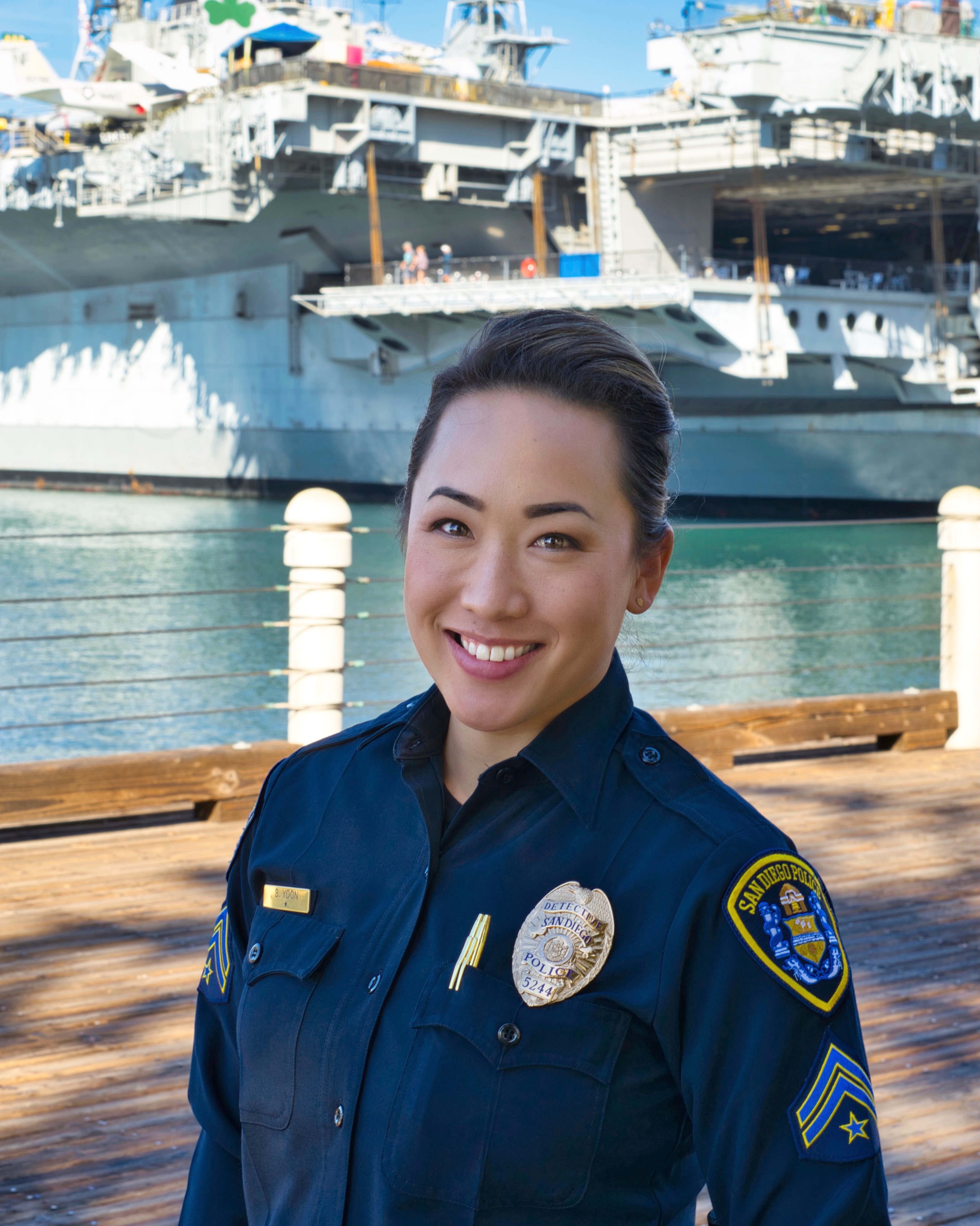Detective Sharon Yoon
San Diego Police Department
San Diego, CA

Why did you become a police officer?
At a very early age, I knew I enjoyed helping people. I discovered this when I would volunteer with my community building houses and serving food to the homeless. During my years in college, my passion and desire to help people only grew stronger. I traveled overseas to countries like Uganda, Egypt, China, India, and Korea to volunteer my time with kids living on the streets, HIV/AIDS orphans, and women who suffered violence. Each person I encountered shared their stories with me, which inspired me to want to make a direct impact and change within my own community when I returned home. I became a police officer in Hawaii for 5 years. I was a member of the Crime Suppression Team, worked as an undercover officer on multiple operations with the Vice and Narcotics Unit, became a Field Training Officer, and was certified as a Firearms Instructor.
I lateralled over to the San Diego Police Department and worked as a patrol officer before I joined the Crime Suppression Team. After several years, I promoted to detective and began to conduct investigations. I investigated general crimes and later had the opportunity to work in specialized units such as Child Abuse and Homicide. I currently hire police applicants for the Backgrounds and Recruiting Unit. I have a total of 14 years of law enforcement experience. Those years have been rewarding because I was given the opportunity to make a direct influence on my community.
What motivates you to succeed?
My parents are a huge motivation for me to be successful in life. They grew up in South Korea. They immigrated to the U.S. with very little money and zero English-speaking abilities. With the odds against them, they still strived to create a life of opportunities for our family. My dad encouraged me to be a trail blazer in a work field that did not have many Korean American females. When I expressed my interest in law enforcement, my dad was exhilarated. He told me it would bring the Korean community a sense of pride and familiarity to see a Korean face behind the badge. He told me, without even knowing it, the career decision I made could also be an inspiration for young Asian American females who wanted to become police officers. He believed they would be less intimidated after they saw a person of my demographics and stature and give them confidence, they too could pursue law enforcement as a career. Sure enough, I was recently approached by an Asian female who told me she wanted to become a police officer. She had reservations because she did not feel like she fit the “stereotypical cop mold”. She said after seeing me at a women’s police exposition, she was able to picture herself being a police officer too and decided to go through the hiring process.
What’s your most memorable moment on the job?
Working endless hours on my first homicide case with my team was a memorable moment for me. Detectives and officers poured hours of work into surveillance, operations, interviews, and search warrants to track down and apprehend a homicide suspect who walked into a restaurant and shot 3 innocent victims. He was outstanding and fled from the police, however, was later located and arrested out of state. The fluidity of the teamwork and the desire to bring justice for the families brought me satisfaction. Although we were not able to bring the victim’s loved one back, we were able to bring some closure for the victims’ families after the suspect was found guilty..
What challenges have you faced?
One of several challenges I faced when I first began my career in my early 20s was feeling scrutinized at times by my male colleagues. I felt the need to prove I could do the job mentally and physically just like them. I overcame these challenges by staying in shape, showing my willingness to get involved if other officers needed help, and doubling my daily workload. In hindsight I placed a lot of pressure on myself but the challenges I faced and overcame helped me to become more experienced and well-rounded.
What advice do you have for women considering a profession in policing?
I highly encourage this job for women of all backgrounds. More diversity means different perspectives, a variation of skill sets and experiences which can be beneficial in policing. I would encourage women (and men) to go on a ride-along to experience what we do as law enforcement officers. Research and ask questions to make an informative decision that this is what you want and know why you want this job. Police work is not an easy profession and can even feel thankless at times. For me personally, what makes police work so rewarding is that you have the opportunity to personally help someone in need or make a meaningful impact that could be life-changing.
How we’re changing policing
The 30×30 Initiative is a coalition of police leaders, researchers, and professional organizations committed to advancing and supporting the representation, experiences, and well-being of women at all levels of law enforcement, both in the U.S. and beyond.
Research shows that women play a crucial role in building community trust, de-escalating conflict, and improving public safety outcomes, with evidence linked to reduced use of force and enhanced relationships with the communities they serve. However, women represent less than 14% of sworn officers and 20% of recruits in state and local law enforcement agencies. Additionally, about 40% of the approximately 18,000 law enforcement agencies in the U.S. have no full-time women officers (Source: Bureau of Justice Statistics).
We are collaborating with hundreds of agencies to make law enforcement a profession where qualified women who are drawn to it feel welcomed and supported while ensuring agencies address their unique needs and foster their success.